Posts Tagged ‘Category Design’
110 Startup Marketing: Viviana Faga Emergence Capital
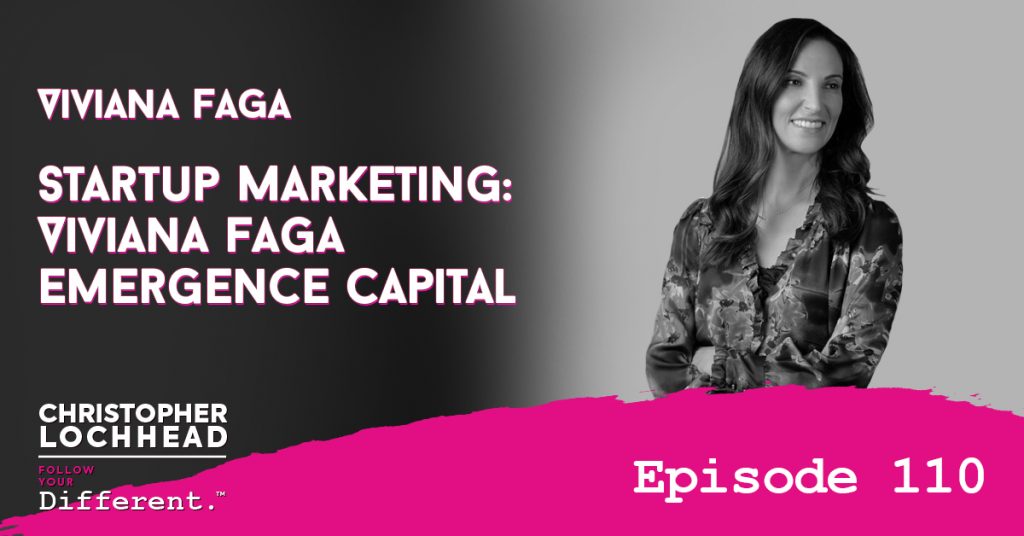
Podcast: Play in new window | Download (Duration: 1:03:10 — 58.1MB) | Embed
Subscribe: Apple Podcasts | Spotify | Pandora | RSS | More
We have another riveting and insightful episode today with Viviana Faga, Operating Partner at Emergence Capital. She is in-charge of marketing and helped create over 150B in new market cap. Today she shares some of her amazing experiences working both with startups and VCs.
The Importance of Marketing
Viviana Faga worked in Senior Marketing roles with companies like Salesforce.com and Zoom Communications. She was the Head of Marketing at Yammer and pioneered the enterprise social space.
At the moment, she coaches CEOs and Founders and leads them in finding the importance of marketing in scaling their businesses.
“You just got $5-15M and you’re thinking, ‘where do I want to spend my money? I want to spend money on building my product and I don’t know who to hire? Why should I hire a marketer? It just seems like one big massive waste.’ That’s what I deal with and those are the kind of questions that I get everyday.” – Viviana Faga
The Best Doesn’t Always Win
Viv narrates her current client who has a great product, but is currently in a category that his competition built. Viv find it fascinating to explain that the best products doesn’t always win. If a CEO doesn’t believe in this, the CEO then finds himself in a never ending cycle of “catch-up.”
“There are plenty of cases where it does. The company just sort of takes off, without great marketing. We’ve seen that. But for the most part, in the competitive market, if you don’t define the category, if you don’t create it, you’re going to really struggle because now you’re gonna look like you’re playing catch up.” – Viviana Faga
Viv advises her clients that the company will never be able to catch up if they continue copying the competition’s message.
“You have to change the game. Come up with completely new messaging. You have to go so hard at writing that message — from your press releases, website and sales collateral. Every single piece of content that is external facing has to speak this new language.” – Viviana Faga
CEOs Who Listen
Viviana was proud to say that she embedded herself into her client’s company. Other than this, she believes that she can only help those who are willing to listen. She narrated how she turned down the CEO of Yammer, twice.
“It was hard to turn him down, but obviously he convinced me. I wanted to work for a CEO who understood the value of marketing and after that conversation, I wasn’t so sure but a lot of folks from Salesforce have gone there. It’s our job to convince him Sales & Marketing matter.” – Viviana Faga
To hear more about Startup Marketing: Viviana Faga Emergence Capital and more relevant information about Viviana Faga, download and listen to the episode.
Bio:
Viviana brings over fifteen years of experience designing and building brand categories for successful cloud/SaaS and enterprise social companies, helping them create scalable growth engines that drive successful exits.
Her particular passions are scaling and structuring go-to-market SaaS teams, messaging and positioning, category creation, freemium product strategy, and sales enablement.
Before joining Emergence, Viviana served as VP of marketing for Yammer, where she defined the enterprise social category. After Yammer’s $1.2B acquisition by Microsoft, she became its head of marketing for enterprise social, which included Office 365, Skype, and Lync. She also spent over six years at Salesforce, where she launched several key product initiatives. Additionally, she was the VP of marketing for Platfora (now Workday) and the CMO of Zenefits.
Links:
Emergence Capital – Viviana Faga
103 The Power of an IPO with Eric Yuen
011 The Perception of your product is your product
We hope you enjoyed this episode of Follow Your Different™! Christopher loves hearing from his listeners. Feel free to email him, connect on Facebook, Twitter, Instagram and subscribe on iTunes! Get amazing, different stories on business, marketing, and life. Subscribe to our newsletter The Difference.
108 Top 1% of Enterprise Technology Investors Bruce Cleveland
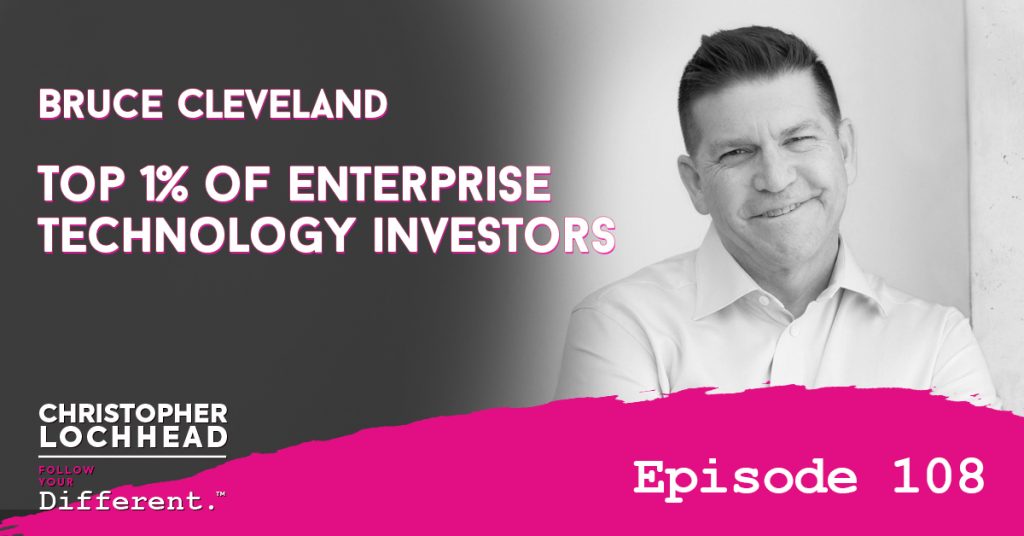
Podcast: Play in new window | Download (Duration: 1:00:16 — 55.5MB) | Embed
Subscribe: Apple Podcasts | Spotify | Pandora | RSS | More
As we continue our run on legendary VCs, we feature today Bruce Cleveland, an entrepreneur, executive, venture capital investor and best selling author of Traversing the Traction Gap. We have a fun and insightful conversation today about the state of enterprise tech and why its the best place to create enduring value. We also touch important points on digital transformation and a lot more!
Legendary VCs
Joining our list of legendary VCs that we have featured on Follow Your Different is Bruce Cleveland. He joins Randy Komisar (Episode 106) and Heidi Roizen (upcoming episode). He is the founding partner of Wildcat Ventures which has been rated in the top 1% of enterprise technology investors on the planet.
At the moment, he is taking up his Masters Degree at John Hopkins University, America’s first research university. He took up Digital Communication, which he feels would be beneficial for writing content for his succeeding books.
Enterprise Tech Scene
Bruce shares a number of important insights into the enterprise tech scene. Furthermore, he shares that the valuations of companies of public SAS companies or tech companies selling into enterprise using a subscription model are reflective of the enduring value.
Additionally, he cites examples of consumer companies that require a tremendous amount of capital, as opposed to enterprise companies, which require much less.
“Consumers require so much capital, not a fund to build a product but to build the market share.” – Bruce Cleveland
Enterprise vs. Consumer Company
Bruce shares what investors are looking for enterprise and consumer companies. The MOIC or The Multiple On Investment Capital is nominally better in an enterprise. However, he mentions that the issue is these enterprise companies take longer to build up.
“You don’t get those big mark up in the first 2 years, as the company began to scale and show minimum viable traction. The important part here is a lot of limited partners, people who invest in venture firms. They want to see early mark up in your funds.” – Bruce Cleveland
These investors want to see great markups to show the committee that the firm is of great financial health. However, they don’t inform the committee how much money they need to get the company “out of the door.”
“They are extraordinarily capital intensive, and the multiple uninvested capitals are high. A lot of these things are faddish. They may work initially, I don’t know, they can move in other areas. Then they’ll be okay, but a lot of times, these things can come and go.” – Bruce Cleveland
To hear more about the Top 1% of Enterprise Technology Investor Bruce Cleveland, download and listen to the episode.
Bio:
Bruce Cleveland is a Founding Partner at Wildcat. He focuses on investments in AI marketing, EdTech, enterprise software as a service (SaaS) and the Internet of Things (IoT).
He’s also the author of Traversing the Traction Gap.
His specific areas of interest include enterprise automation, education and training, and general business applications. Bruce likes working with early-stage companies that use technology and data to increase revenue and decrease costs.
An avid adventurer and sailor, Bruce enjoy the challenge of creating new companies and navigating new markets.
He is interested in growing entrepreneurial hubs outside of Silicon Valley, with a particular focus on the Pacific Northwest.
Bruce also is committed to sharing his knowledge and experience through the Traction Gap Framework™. This aims to help entrepreneurs navigate the critical go-to-market period between initial product release (IPR) and reaching minimal viable traction (MVT).
As a son of school teachers, Bruce supports continued education.
He founded GreenFig to offer applied business science training to higher-ed students and individuals in job transition.
Bruce held senior executive roles in engineering, product management and product marketing. He worked with companies, such as Apple, AT&T, Oracle, and Siebel Systems.
In this role, Forbes and IDC credited him with creating the most effective B2B alliance program in the software industry.
Bruce began his venture capital career at InterWest Partners, where he was the first investor and a former board member of Marketo. The company held an IPO in 2013 and was acquired by Vista Equity Partners in 2016 for $1.8 billion.
Bruce attended the United States Military Academy, West Point, and received a B.S. in business administration from CSU, Sacramento.
Links:
We hope you enjoyed this episode of Follow Your Different™! Christopher loves hearing from his listeners. Feel free to email him, connect on Facebook, Twitter, Instagram and subscribe on iTunes! Get amazing, different stories on business, marketing, and life. Subscribe to our newsletter The Difference.
107 How FanDuel Became a Category King & The Future of Podcasting w/ Nigel Eccles
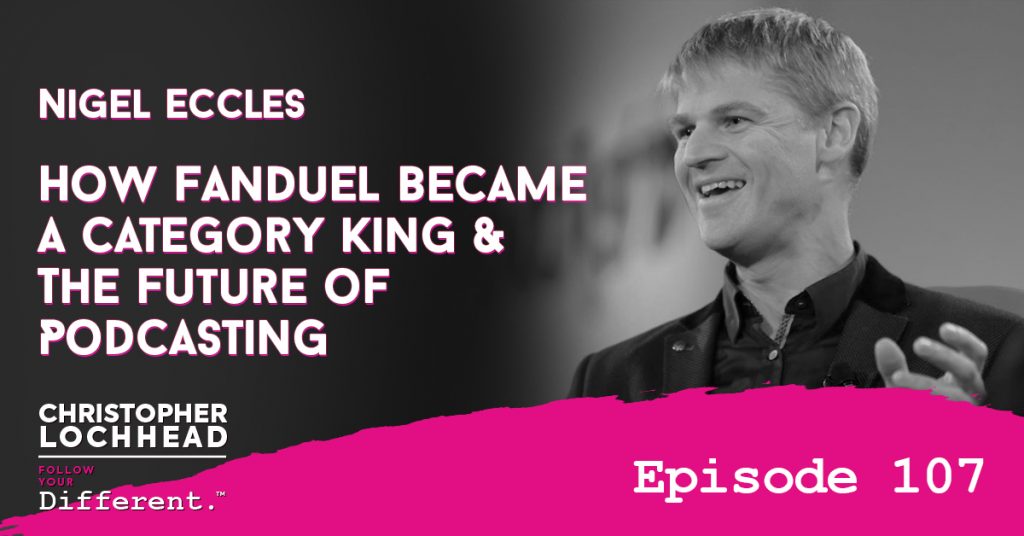
Podcast: Play in new window | Download (Duration: 1:31:48 — 84.3MB) | Embed
Subscribe: Apple Podcasts | Spotify | Pandora | RSS | More
Our guest is the legendary entrepreneur Nigel Eccles. He’s the founder of Fan Duel, the category king in Daily fantasy sports. We go deep on how Fan Duel created and ultimately dominated this mega category.
We also talk about how they created a super-engaged community and how they explored podcast advertising to promote the brand. Nigel explains why he thinks podcasting is a massive new opportunity. In fact, it is one of his motivations why he started his new company, Flick.
FanDuel Fantasy Sports
Forbes reports that daily Fantasy Games is growing at 41% annually, and will be $14.4 billion category in 2020. This brought together five lads from Edinburg Scotland to join this trend. They created FanDuel back in 2009 as they wanted to create a simple platform for fantasy sports enthusiasts.
“We wanted to build something that is so simple and even we can play and I think actually is a big part of the success of the company.” – Nigel Eccles
Building Communities
Nigel narrated how they started FanDuel 10 years ago. When they started FanDuel, Fantasy Sports was played by 25 million people in North America. Their main motivation was creating a sort of community with the same interests — a platform that would connect individuals, not only with friends but with tens of thousands of people.
“It started to connect people who were players. It started to build a community. People want to do it more and more because they want to show they were the best in the community.” – Nigel Eccles
Nigel shares his tips for entrepreneurs when building a community. He advises to first, think about the direct connection you can have with customers and what mechanism can you use to establish that connection. Secondly, entrepreneurs must think about how these customers can connect with each other.
Podcast Advertising
As FanDuel was starting, Nigel and the other founders realized the user base is not growing. Their CMO planned to execute several advertising campaigns, mostly focusing on radio and podcasting. With a great product and innovative advertising, the business grew largely.
“The great thing about FanDuel is, anybody who listens to sports radio was a sports fan.” – Nigel Eccles
Nigel and his team tried a lot of different formats on radio and podcast advertising. They had endorsements and games, where listeners get to compete with the hosts. Christopher shared a lot of information about podcasting and how huge the opportunity is for advertising.
“Podcasting is an enormous opportunity. It is hugely unmonetized. It is one of the best advertising mediums today because there’s a connection with the host. It’s such a strong endorsement. The best hosts only sell what they believe in.” – Nigel Eccles
To hear more about how FanDuel became a Category King and the future of podcasting, and more relevant information about Nigel, download and listen to the episode.
Bio:
Nigel has vast startup experience and was previously the co-founder and CEO of FanDuel, one of Scotland’s first unicorn companies.
Links:
We hope you enjoyed this episode of Follow Your Different™! Christopher loves hearing from his listeners. Feel free to email him, connect on Facebook, Twitter, Instagram and subscribe on iTunes! Get amazing, different stories on business, marketing, and life. Subscribe to our newsletter The Difference.
016 Category Creation Courage
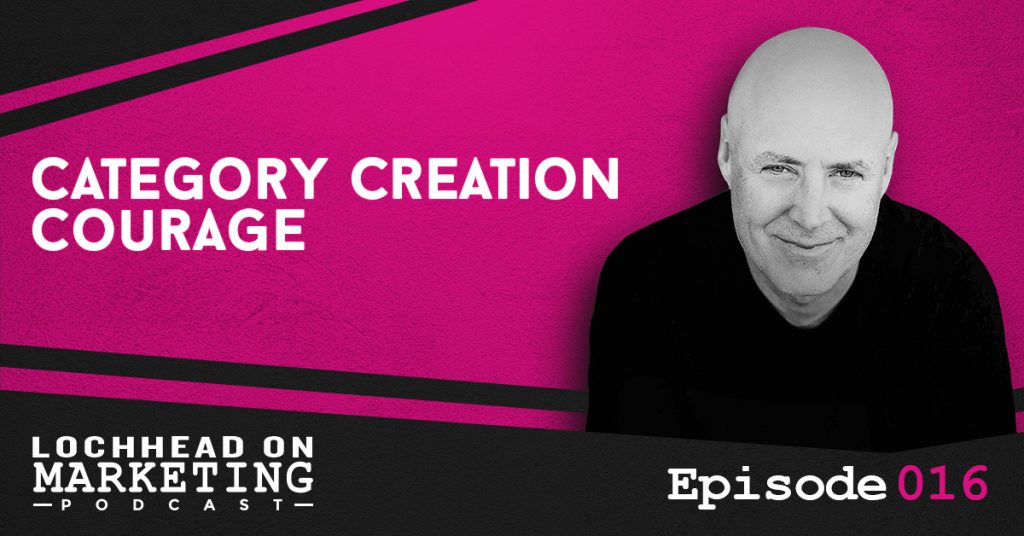
Podcast (lochheadonmarketing): Play in new window | Download (Duration: 8:20 — 7.7MB) | Embed
Subscribe: Apple Podcasts | Spotify | RSS | More
In today’s episode, Christopher Lochhead talks about why courage is a critical ingredient for legendary marketing and category design. He poses the question: “What does it take to make legendary marketing happen?” and he shares some except his book Niche Down to answer this.
Break From The Pack
What does it take to break from the pack? The pack, which usually means the general public, the people who think and does the same kind of marketing. What do we need to enable us to design a category and from then, execute to dominate that category?
On Christopher’s second book, Niche Down, co-writer Heather Clancy wrote some very important pointers in creating a category
“I hope you find it informative and inspiring as it relates to summoning the courage to actually do something legendary, design and dominate a category.” – Christopher Lochhead
Excerpts from Niche Down
Heather Clancy wrote in the book:
Category design actually requires going against that pack mentality. Humans have a primordial need to feel safe in numbers. We get a lot of positive feedback from being the same as others. Our challenge to you is to break from the pack. Free the creative part, the innovative part,the legendary part of you — and let that part be different.
Our dream is that you harness the exponential power of what makes you different versus the incrementalism of just being better. Because it is being different that makes a difference. And we know how tough that can be.
“Kermit The Frog” famously sang: “It’s not easy being green.”
Bill Walton, the NBA legend commiserates: “In life, things go wrong. In life, things collapse….People try to drag you down and people try to say ‘No’ to you.”
He goes on to posit, “I want to live in a world of ‘Yes’.” Of course, there will be a lot of “losery” along the way. To be legendary is to be ready for setbacks, disappointments and failures.
Because shit happens. Sometimes, life can be crushing. We’ve both been crushed more times than we can count. It’s okay to be a loser.
We all are. Failure is our teacher. Failure is our friend. Failure is our coach. Failure gives us humility. Failure gives us grit. Failure gives us a foundation. Losing is an essential ingredient for being legendary. Every time we lose we have a choice.
Give up.
Or, take the loss head on, learn from it and execute like a badass legend.
It Takes Courage to be Legendary
What Heather and Christopher are trying to communicate is the “emotional or psychological” barrier in doing legendary marketing. To put it simply, it takes a lot of courage to be legendary. Courage is moving forward in pursuing your plans, even though a lot of evidence states it won’t work.
Christopher cited his other podcast, Follow Your Different as an example. Regardless of what the experts in the podcasting industry were telling him — that business people will not listen to a long-form, unedited conversation podcast — FYD has become a top 200 overall charting podcast in the United States.
“If you believe in the problem you’re solving and you believe in your vision, then go with it. Be different, stick to it and have the courage to be legendary and execute like a badass legend.” – Christopher Lochhead
To hear more about Category Creation Courage and more relevant information from Christopher Lochhead, download and listen to the episode.
Bio:
Christopher Lochhead is a Top 25 podcaster and #1 Amazon bestselling co-author of books: Niche Down and Play Bigger.
He has been an advisor to over 50 venture-backed startups; a former three-time Silicon Valley public company CMO and an entrepreneur.
Furthermore, he has been called “one of the best minds in marketing” by The Marketing Journal, a “Human Exclamation Point” by Fast Company, a “quasar” by NBA legend Bill Walton and “off-putting to some” by The Economist.
In addition, he served as a chief marketing officer of software juggernaut Mercury Interactive. Hewlett-Packard acquired the company in 2006, for $4.5 billion.
He also co-founded the marketing consulting firm LOCHHEAD; was the founding CMO of Internet consulting firm Scient, and served as head of marketing at the CRM software firm Vantive.
Links:
Niche Down: Become Legendary Different
We hope you enjoyed this episode of Lochhead on Marketing™! Christopher loves hearing from his listeners. Feel free to email him, connect on Facebook, Twitter, Instagram and subscribe on iTunes!
015 Product-Market Fit Is A Dangerous Idea
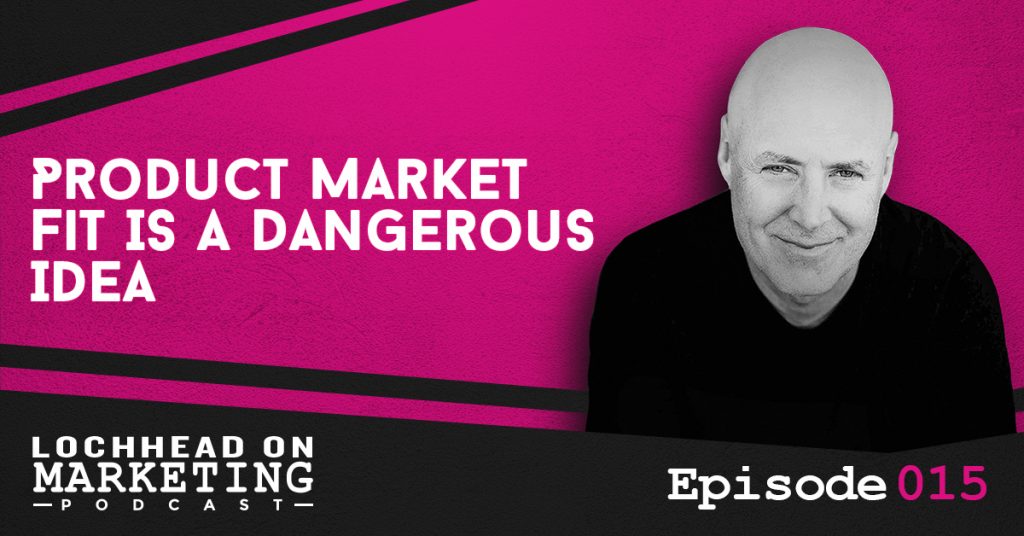
Podcast (lochheadonmarketing): Play in new window | Download (Duration: 12:51 — 20.7MB) | Embed
Subscribe: Apple Podcasts | Spotify | RSS | More
In most industries, product-market fit is an unquestioned gospel, even in Silicon Valley. On the contrary, Christopher believes that product-market fit is a dangerous idea. Why? Because legendary marketers create and design their own category, as opposed to competing in an existing category.
Product-Market Fit
In the tech startup world, achieving product-market fit is often considered a major milestone. However, Christopher argues that product-market fit is one of the most dangerous ideas in business today.
“The problem with product-market fit is that language can trick marketers into thinking that what you’re doing is building a product and you’re trying to fit it in a market.” – Christopher Lochhead
Legendary creators are not looking to “fit” into a market, instead, they want to stand out. Standing out means to design their own market category.
Category King and Queens
Christopher cites some of the category kings and queens of today. Think about Jeff Bezos, he is equated with the term eCommerce, just as we equate Pablo Picasso with Cubism. We also have Sara Blakely of Spanx, who created her own category of Shapeware, not just trying to fit into the girdle category.
“Think about the most respected entrepreneurs, creators, and innovators. a huge part of why we all respect them is because they broke or took new ground.” – Christopher Lochhead
Some other great examples are AirBNB, which presented a new idea and experience for tourists and travelers. Another one is Evian, who deviated from the idea that water is free. Red Bull also dominated their energy drink category, as opposed to hydration drinks, where Gatorade was category king.
“The greatest innovators teach the world to think differently. With a fresh idea, a new take on an old problem or by solving a problem we didn’t even know we had.” – Christopher Lochhead
Where the Challenge Lies
The challenge of product-market fit is, it can trap inventors and creators into thinking that they can test their product and service to people and f they consume it, they equate it to the future success of the product. If these people do not consume the product intuitively, then they can just go back and work on the product.
This is in opposition to Henry Ford’s mindset who said: “If I had asked people what they wanted, they would have said faster horses.” Moreover, even Steve Jobs has the same ideas on product-market fit, saying “customers don’t know what they want until we’ve shown them.”
“The big ah-ha here is that there is a massive distinction between fitting into an existing market category and competing versus creating your own new market category.” – Christopher Lochhead
To hear more about why Product-Market Fit Is A Dangerous Idea and more relevant information from Christopher Lochhead, download and listen to the episode.
Bio:
Christopher Lochhead is a Top 25 podcaster and #1 Amazon bestselling co-author of books: Niche Down and Play Bigger.
He has been an advisor to over 50 venture-backed startups; a former three-time Silicon Valley public company CMO and an entrepreneur.
Furthermore, he has been called “one of the best minds in marketing” by The Marketing Journal, a “Human Exclamation Point” by Fast Company, a “quasar” by NBA legend Bill Walton and “off-putting to some” by The Economist.
In addition, he served as a chief marketing officer of software juggernaut Mercury Interactive. Hewlett-Packard acquired the company in 2006, for $4.5 billion.
He also co-founded the marketing consulting firm LOCHHEAD; was the founding CMO of Internet consulting firm Scient, and served as head of marketing at the CRM software firm Vantive.
Links:
Quora: How do you define Product-Market Fit?
We hope you enjoyed this episode of Lochhead on Marketing™! Christopher loves hearing from his listeners. Feel free to email him, connect on Facebook, Twitter, Instagram and subscribe on iTunes!
103 The Power of an IPO w/ Eric Yuan, Founder of Zoom Communications
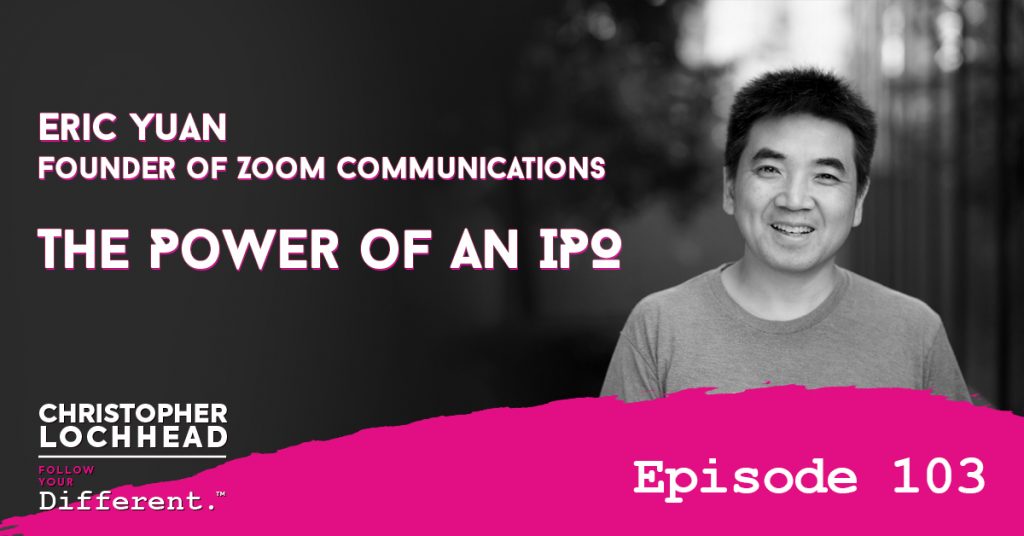
Podcast: Play in new window | Download (Duration: 59:00 — 54.3MB) | Embed
Subscribe: Apple Podcasts | Spotify | Pandora | RSS | More
This is the first in a special two-part series featuring two CEO’s of two recent multi-billion IPOs—Jennifer Tejada, CEO of Pager Duty and billionaire, founder and CEO of Zoom Communications, the amazing Eric Yuan.
Today’s episode features an insightful conversation about how Eric feels like to have a super successful IPO. Eric further shares Zoom’s culture centered on happiness and his motivation, mission and vision for Zoom and much more.
Culture of Happiness
Eric Yuan guested at Christopher’s previous podcast, Legends and Losers Episode 032. As of recording time, Zoom Communications raised $357M in IPO and is a $20+ billion market cap company.
“When I wake up, the first person I ask is myself. Do I feel happy or not? I encourage our employees to ask the same questions. Ultimately, if our employee is not happy, I’m pretty sure they cannot give happiness to our customers. That’s why we keep the happiness culture here.” – Eric Yuan
Christopher cited some amazing data from GlassDoor. Employees rated Zoom 4.8, 5 being the highest. On the question “would you recommend Zoom to a friend, as a great place to work,” 95% said yes. Lastly, on CEO approval, 97% of the respondents said they approve of the way Eric runs the business.
“I think based on that, I should focus on the 3% and plus the 5% why they do not recommend us too. Again, we always like all those feedback to help us become a better company.” – Eric Yuan
Zoom: The Game Changer
Christopher admires how Eric runs his company and how he epitomizes everything great about entrepreneurship, technology, and innovation. He has changed the game in the B2B space in North American and now, internationally. As Christopher says, Zoom has made impossible, possible, such as the ability to work from home and collaborate with the team in different countries.
“I truly feel we just started. We look at our user base and our customer base, compared to the number of knowledge workers worldwide, I think we just started. A huge opportunity ahead of us. How to connect workers worldwide, if you look at the total market, it’s also huge. Look at our revenue, we just started.” – Eric Yuan
Vision and Mission for Zoom
In the next 5 years, Eric candidly shares that he visualizes Zoom to give people a whole new experience in meeting and communicating, even aiming to replace the whole face to face meeting.
“We truly believe data communication is the future, video is the new voice. In the future, no matter where you are, no matter which device you are using, just one click, you can talk with anyone in the world. You can speak on your language and understand with real-time translation.” – Eric Yuan
Christopher also discusses with Eric the amazing marketing strategies that they employ, especially the huge advertisements in major airports in the US.
“They should leverage our technology. Since it’s good for the family and good for society as well. Our goal is to make sure our existing customer is happy. Whenever they travel, [we remind them] you already have Zoom, why do you travel often?” – Eric Yuan
To hear more about The Power of an IPO, and to learn more information about Eric Yuan, Founder of Zoom Communications, download and listen to the episode.
Bio:
Prior to founding Zoom, Eric was corporate vice president of engineering at Cisco, where he was responsible for Cisco’s collaboration software development. Eric was one of the founding engineers and vice president of engineering at Webex. Between 1997 and 2011, he grew his team from 10 engineers to more than 800 worldwide and contributed to revenue growth from $0 to more than $800M.
In 2017, Eric was added to the Business Insider list of the 52 Most Powerful People in Enterprise Tech. In 2018, he was named the #1 CEO of a large US company by Glassdoor and EY Entrepreneur of the Year in Northern California (software category). Eric is a named inventor on 11 issued and 20 pending patents in real-time collaboration.
Eric earned a certification from the Stanford University Executive Program.
Links:
We hope you enjoyed this episode of Follow Your Different™! Christopher loves hearing from his listeners. Feel free to email him, connect on Facebook, Twitter, Instagram and subscribe on iTunes!
012 Category Creation Economics 101
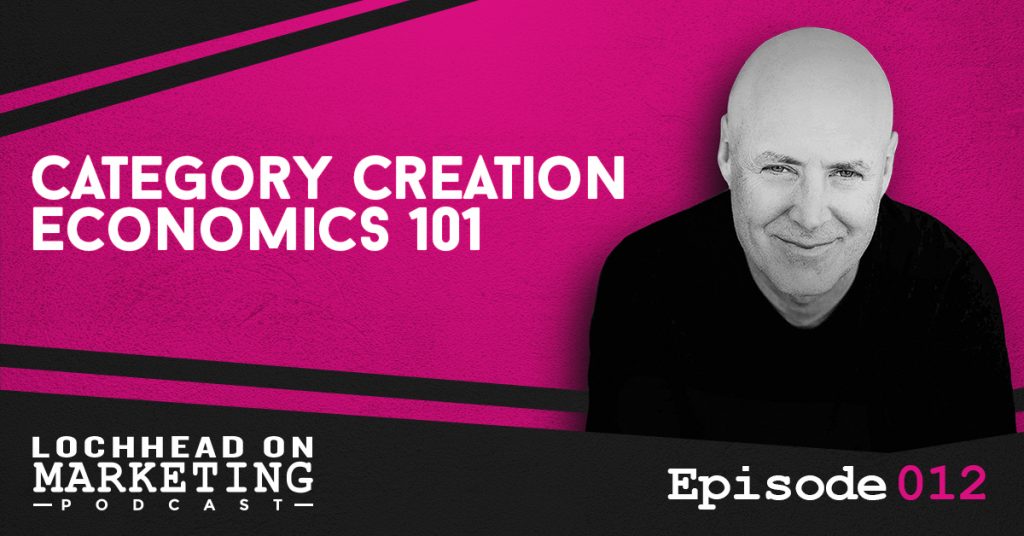
Podcast (lochheadonmarketing): Play in new window | Download (Duration: 14:30 — 13.4MB) | Embed
Subscribe: Apple Podcasts | Spotify | RSS | More
In this episode, Christopher Lochhead talks about the powerful, surprising winner-take-all realities of categories and why you want to be the category queen/king in your market. Christopher layout facts and data on category creation economics that you’ll find beneficial for your business, whether you’re in the tech industry or not.
Winner Takes All
In Christopher’s first book Play Bigger, they wrote about a research project they conducted on thousands of tech start-ups from 2000 to 2015, determining the market cap or valuation. Specifically, they wanted to know the percentage of the total value goes to the leader or category queen. In reality, one company gets 2/3 for the entire market category.
“The study shows that category queens earned 76 percent of the market capitalization of their entire market categories.” – Christopher Lochhead
Christopher’s good friend, Bob Evans said: “every company is a software company.” Tech company dynamics are now applicable to non-tech companies.
VCs “Me Too Strategy”
Christopher quoted a portion from his book Play Bigger. VCs oftentimes fall for the Me Too strategy where every firm would invest in some company in an emerging category, thinking it will succeed just like the first one who did.
“In Silicon Valley, we’ve watched venture capitalists (VCs) increasingly adopt a category king investment philosophy. Paul Martino of Bullpen Capital notes that VCs used to have a “me-too” strategy. If a start-up hit it big and opened up a hot new category, the many VC firms in Silicon Valley assumed that there was room for a lot of winners in that category.” – Christopher Lochhead, Play Bigger
Furthermore, Paul Martino tells us “it’s now apparent that one company wins big and dominates a healthy c0ategory, and the rest struggle, get acquired or perish. That means that as soon as one company appears to be the category king, the smart money competes to invest in that company, bidding up its value.”
Category Creation is the Ultimate Strategy
Christopher’s friend and category guru to Fortune 500 companies Eddie Yoon wrote for Harvard Business Review on the financial impacts of category creation.
He reported that “top 20 firms in Fortune‘s 2010 list of fastest-growing companies received $3.40 in incremental market capitalization for every $1.00 of revenue growth. Half the top 20 companies grew via category creation. Wall Street exponentially rewards the category creation companies, giving them $5.60 in incremental market capitalization for $1.00 in revenue growth.”
“No matter how you want to look at it, the bottom line is category kings take the vast majority of economics and are massively rewarded for becoming the category queen of the space.” – Christopher Lochhead
To hear more about the category creation economics 101 and more relevant information from Christopher Lochhead, download and listen to the episode.
Bio:
Christopher advised over 50 venture-backed startups. He is a Venture Capital Limited Partner and a former three-time Silicon Valley public company CMO, entrepreneur. In addition, he co-authored two bestsellers: Niche Down and Play Bigger.
After he flunked school, with few other options, Christopher started his first company at the age of 18.
He was a chief marketing officer of software juggernaut Mercury Interactive. Hewlett-Packard, in 2006, acquired that company for $4.5 billion.
Further, he also co-founded the marketing consulting firm LOCHHEAD. Christopher was the founder/CMO of Internet consulting firm Scient. He also served as head of marketing at the CRM software firm Vantive.
Christopher loves his family and friends. He thinks the Ramones are legendary and loves riding the mountains and waves of Northern California.
Links:
Category Creation Is the Ultimate Growth Strategy
Fortune‘s 2010 list of fastest-growing companies
We hope you enjoyed this episode of Lochhead on Marketing™! Christopher loves hearing from his listeners. Feel free to email him, connect on Facebook, Twitter, Instagram and subscribe on iTunes!
099 Persuasion w/ Lee Hartley Carter
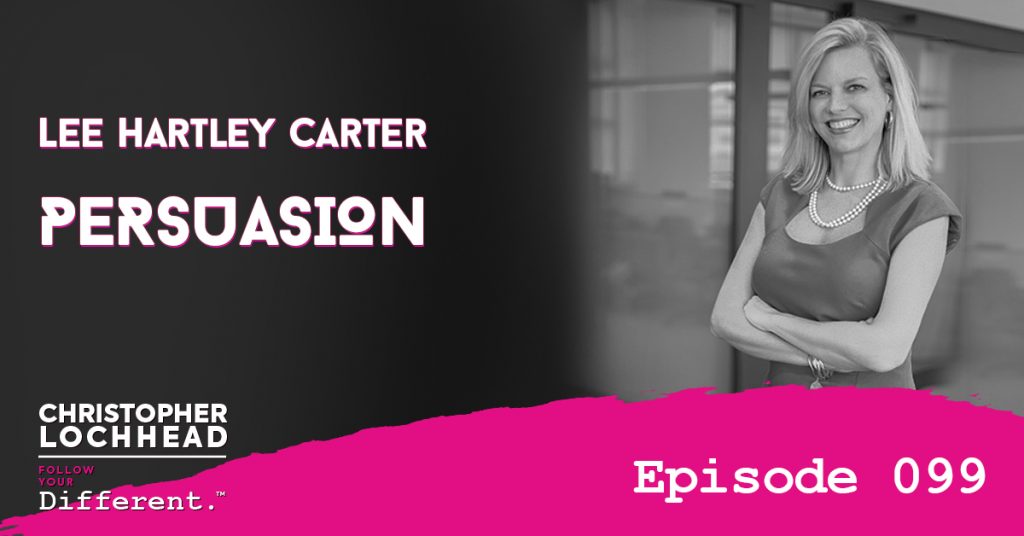
Podcast: Play in new window | Download (Duration: 1:16:30 — 70.3MB) | Embed
Subscribe: Apple Podcasts | Spotify | Pandora | RSS | More
Languaging Master Lee Hartley Carter joins us today for a riveting conversation about the power of language and the art of persuasion. She discusses today how language shapes everything in our lives and how to use language to convince people when facts don’t seem to matter.
Marketers and non-marketers will surely learn a ton from this conversation about communications, language strategy, and persuasion.
The Power of Language
Lee candidly shares with Christopher that she never thought about a job opportunity which involves words and messaging. When she was younger, she considers herself as obsessed with words.
For her, language is the means in which people can connect with other human beings and convey thoughts, feelings, and perspectives. Language is a powerful tool with every word, having its own meaning.
“That change in language changes thinking, which ultimately change social beliefs and norms and potentially laws and governance approaches. It can change a lot of things.” – – Lee Hartley Carter
Language Strategy in Marketing
Lee further cites examples of how the smallest change in language can have a huge impact. She cited differences in words such as estate tax/death tax, or global warming/climate change, or used vehicles/pre-owned vehicles. A simple change of words can reshape how people think about the message.
Lee also shared the common mistake marketers make in conveying a message. Oftentimes, marketers tend to “speak louder” — to share more facts to try and get the point across. This doesn’t end well, as people get turned off with the over-communication.
“Instead, what you need to do is to not speak louder but speak smarter. The way that speaks smarter is by slowing down and really saying ‘you know what, this isn’t about what I want to say. This is about what they need to hear.’” – Lee Hartley Carter
Crisis Communications
In an interesting turn of the conversation, Lee and Christopher discussed crisis response. Lee laid out her step by step advice on companies facing a crisis. First, she says that freaking out is a natural response to a crisis. However, she noted that it’s important to understand what your target audience is thinking or is feeling at that moment.
“Who are you trying to convince right now that you’re okay, is it your shareholders? is it your customers? What are they afraid of right now? What value have you just betrayed in them?” – Lee Hartley Carter
They had a great dialogue on crafting emergency messages as Christopher had his own fair share of stories to tell, with regards to crisis communications and response.
To hear more about Persuasion and more relevant information about Lee Hartley Carter, download and listen to the episode.
Bio:
After a crushing loss in a student council race in the 6th grade, Lee learned the importance of getting the story right from the beginning.
In the 7th grade, when she ran again, she ran on a story that was driven by some middle school polling techniques she employed among her classmates.
And, she won.
Ever since she has had a passion for language. For the message. For the story.
And she brings this passion to her role as partner at m+p, a research-driven language strategy firm that specializes in finding the right language and messages based on one simple idea: it’s not what you say that matters, it’s what they hear.
A member of the executive leadership team, Lee oversees a diverse range of language strategy work for Fortune 500 companies and non-profits in the U.S. and abroad.
To do this, Lee has conducted, overseen, and analyzed countless instant response sessions, traditional focus groups, brainstorming and strategy sessions. and surveys in more than 15 countries.
She has worked with clients in a wide range of industries including financial services, energy, automotive, sustainability, hospitality services, food and beverage, technology, and consumer products.
And, she has worked extensively in public affairs, public policy, and issue advocacy.
Before joining Maslansky + Partners, Lee spent more than ten years in marketing and strategic communications.
And, like many of her colleagues at m+p got her start in politics advocating for teaching hospitals, graduate medical education, the use of bicycle helmets, and healthcare for those who couldn’t afford it.
Lee serves as a member of the National Head Start Association advisory board focusing on messaging, is a fellow of the National Committee on US-China Relations Young Leadership Forum, and an occasional contributor to Fox News and MSNBC.
Links:
We hope you enjoyed this episode of Follow Your Different™! Christopher loves hearing from his listeners. Feel free to email him, connect on Facebook, Twitter, Instagram and subscribe on iTunes!
011 The Perception of Your Product is Your Product
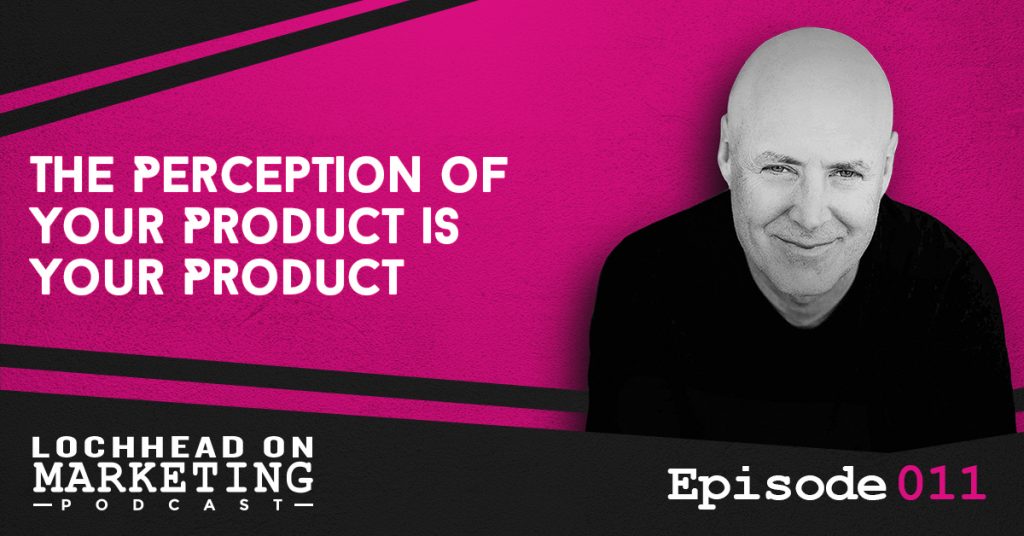
Podcast (lochheadonmarketing): Play in new window | Download (Duration: 9:13 — 8.5MB) | Embed
Subscribe: Apple Podcasts | Spotify | RSS | More
In this episode. Christopher Lochhead talks about what your real product or real service is. He discusses why product development and marketing should team because the perception of your product is your product.
Marketing Defined
One CEO, who is also a good friend of Christopher, once stated that “Marketing is what you do when you have a shitty product.” He was telling Christopher about their competitor who had a significantly inferior product but is, at that time, out-marketing them. Additionally, quite a lot of people in Silicon Valley also think this way.
Wikipedia defines marketing and product as such: “In marketing, a product is an object or system made available for consumer use; it is everything that can be offered to a market to satisfy the desire or need of a customer.”
“I actually don’t want to disagree with Wikipedia, but I do want to propose a different perspective. Your real product, your real service, is people’s perception of your product and service.” – Christopher Lochhead
The People’s Perception of Your Products
Christopher asserts that your product and service is not your product, but what people say it is, think it is and feel about it. He thinks that what other people say about the product or the service, is the truth, regardless if we think of it as true or not.
He cites examples such as Harley Davidson and Jack Daniels. These brands may not be the most efficient in performance or the most premium whiskey available, but they have made a mark in the minds and the hearts of consumers. In fact, they are considered category kings.
However, Christopher also cited instances when people’s perceptions of product change, such as that of Facebook and Boeing 737 MAX. They can fix their products but the perceptions will take forever to change.
The “Perception Manufacturing Business”
Christopher believes that we are in the “perception manufacturing business.” Further, he mentions that not only does the perception of the product more important than the product itself, but it is also actually what the developer is building when he builds and market the products.
“You don’t make products, you make perceptions about products. That is why legendary marketing is equally important to building legendary products.” – Christopher Lochhead
In conclusion, Christopher says that product engineering, product development, and marketing need to come together. They must realize that they are in the “perception manufacturing business.”
“It is ludicrous to say marketing is what you do when you have a shitty product. Marketing is what you do when you have a legendary product and you want people to perceive it as such.” – Christopher Lochhead
To hear more about the Perception of Your Product is Your Product and more relevant information from Christopher Lochhead, download and listen to the episode.
Bio:
Christopher advised over 50 venture-backed startups. He is a venture capital limited partner and a former three-time Silicon Valley public company CMO, entrepreneur. In addition, he co-authored two bestsellers: Niche Down and Play Bigger.
After he flunked school, with few other options, Christopher started his first company at the age of 18.
He was a chief marketing officer of software juggernaut Mercury Interactive. Hewlett-Packard, in 2006, acquired that company for $4.5 billion.
Further, he also co-founded the marketing consulting firm LOCHHEAD. Christopher was the founder/CMO of Internet consulting firm Scient. He also served as head of marketing at the CRM software firm Vantive.
Christopher loves his family and friends. He thinks the Ramones are legendary and loves riding the mountains and waves of Northern California.
We hope you enjoyed this episode of Lochhead on Marketing™! Christopher loves hearing from his listeners. Feel free to email him, connect on Facebook, Twitter, Instagram and subscribe on iTunes!

